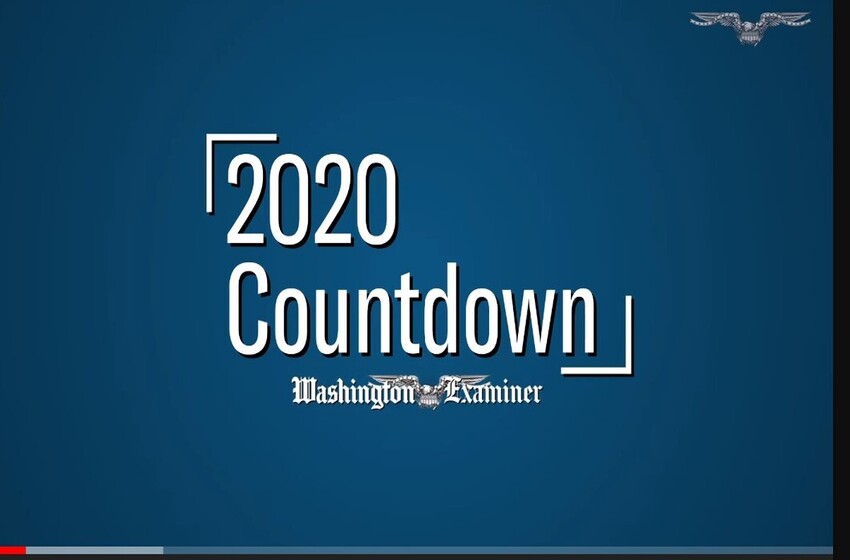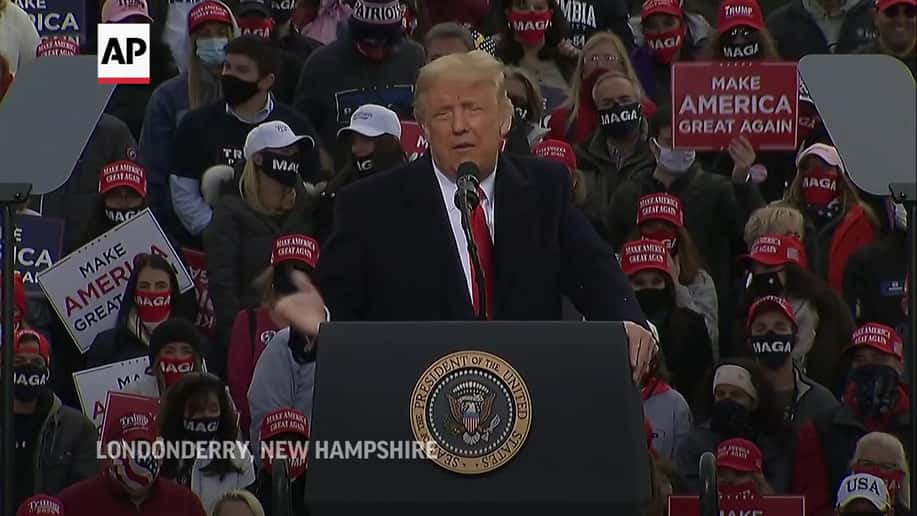The big Trump rallies you don’t see

Screenshot 2020 Washington Examiner
by Byron York, Chief Political Correspondent | October 25, 2020
00:0401:16

WASHINGTON, Pennsylvania — “I can’t believe there aren’t any newspeople here,” said Linda of Greene County, Pennsylvania, as she stood among hundreds of cars and pickup trucks idling in long parallel lines in a vast big-box-store parking lot Saturday, waiting to join the Interstate 70 Trump Train. Indeed, although there were carloads of Trump supporters as far as one could see, and many more on the way from Ohio and West Virginia, and this enormous political event was happening less than two weeks before the presidential election, as far as I could tell, I was the only newsperson there.
It was the biggest political rally no one saw. And gatherings like it have been happening for months in some of the places President Trump needs most to win if he is to be reelected. And, remarkably, the rallies are not the work of the Trump campaign. The road rally in Washington, Pennsylvania, was organized and staged by local Trump supporters, linked together largely by Facebook, who want to show that enthusiasm for the president in western Pennsylvania and surrounding areas is not just strong but stronger than it was when Trump eked out a victory in Pennsylvania in 2016. If Trump wins this critical state, it will owe in significant part to this organic movement and the energetic organizers who have nothing to do with his campaign.
Saturday’s rally started in St. Clairsville, Ohio, in the parking lot of a store called Oil & Gas Safety Supply. After hundreds of cars, probably the majority were pickup trucks, lined up there, they became a rolling rally headed east on I-70 to Wheeling, West Virginia, about 12 miles away. There, hundreds more cars were waiting to join, and the much bigger rally returned to the freeway for the 30-mile drive to Washington. That’s where Linda and several hundred more people were waiting in the parking lot of the other branch of Oil & Gas Safety Supply. The cars from Ohio and West Virginia exited off the interstate, rolled past the Home Depot, then past Oil & Gas, and then, when the last car had passed, the Washington cars joined it, making one massive line of vehicles heading back to St. Clairsville.
There were so many cars — organizers estimated the number to be 2,000, many of them with whole families inside — that it took a very long time to pass through the lot. As that happened, people honked and waved American flags, and Trump flags, too, and talked about why they think it is critical for the president to be reelected.
“We’re here because we believe he is the only way we’re going to have an economy in the future,” said Sherri from Claysville. “You can have a pandemic and distance and be safe and not shut the economy down.” The car rallies themselves are an answer to the problem of campaigning amid a coronavirus pandemic — what could be safer than thousands of people gathered, but all inside their cars?
Maria, from Washington, described herself as a lifelong Democrat who turned Republican when Trump ran in 2016. She and a lot of her family members voted for Barack Obama twice, she said. Now, looking around, she marveled that “the enthusiasm for Trump is unreal.” But one person wasn’t there — Maria’s husband, who was at work in a coal mine in Waynesburg, where he has been a miner for 20 years.
It was no surprise that a crowd in Washington, located in the massive Marcellus Shale oil and gas range, would include a lot of people involved in the energy industry. “We’re a big oil and gas family,” said Kristie from Washington. “We’re living the American dream because of the oil and gas industry.” “Born and raised in it,” added her husband Zane, whose ancestors had drilled some of the first oil wells in McKean County, Pennsylvania. Now, Kristie added, “We’re all about fracking.”
“Check out my license plate,” said one man out his window as I walked by. I looked at the back of his car, and the plate said FRAC-IT. “All in, buddy,” he shouted.
Several other people said they either worked directly in the energy industry or one of the many businesses that support and benefit from it. When I asked if people were connected to the energy industry, my favorite answer came from Dan from Greene County, who said, “Yes, I am connected to the energy industry, because I’ve got electricity and gas in my house.” Point made. We all have a connection to the energy industry. It’s just more obvious to the people living in western Pennsylvania.
They feel so strongly about Trump because they know he has supported their industry while Obama and his vice president, Joe Biden, wanted to cripple and ultimately eliminate it. They know Trump has not miraculously saved the energy industry in Pennsylvania. They didn’t expect that he would. Their calculus was much more basic: In 2016, they voted for the candidate who would stop trying to kill the industry that supports 322,000 jobs in Pennsylvania, according to an energy industry estimate.
Now, they know a President Joe Biden would resume the green crusade to destroy the oil and gas business. On Saturday, they were all very aware that just a few days before, in the last presidential debate, Biden had vowed to “transition” the United States away from oil and gas.
“Would you close down the oil industry?” asked Trump.
“I would transition from the oil industry, yes,” Biden answered.
“Basically, what he’s saying is he’s going to destroy the oil industry,” Trump said a moment later. “Will you remember that Texas? Will you remember that Pennsylvania? Oklahoma? Ohio?”
They do.
There’s no bigger supporter of the industry, or of Trump, than Amy Savage, founder and owner of Oil & Gas Safety Supply. The company’s name is a reminder that working in the oil and gas industry can be dangerous. It sells hard hats and flashlights and gas monitors and eye protection and all sorts of flame-resistant clothing. Most Americans don’t have to worry about donning flame-resistant wear for work, but in the energy-producing areas of Ohio, West Virginia, and Pennsylvania, it’s a real concern. It shows that the energy Americans enjoy comes at a cost that goes beyond dollars.
Originally from Michigan, Savage saw the fracking boom in the area and moved to Washington in 2012. She was working in the safety field and noticed that it sometimes took workers weeks to get the proper protective clothing. That made it hard for a company to hire a worker and put him to work quickly. Savage’s idea was to provide clothing at a lower price — she designs it herself and has it manufactured in China — and available immediately. The idea caught on; by 2018, Oil & Gas Safety Supply, operating two stores, one in Washington and the other in St. Clairsville, was doing $12 million in annual business.
Savage saw a striking change when Trump was elected. “Immediately, the oil fields in Pennsylvania were getting back to work,” she told me. “They were drilling, drilling, drilling, and fracking, fracking, fracking. There were more oil and gas workers, more truck drivers, more hotels, more restaurants, more shopping centers. This area has exploded in the last three years with this influx of people. It was an economic explosion because you had a president standing behind the oil and gas industry in these three states, saying we need to be energy independent.”
“And now, Joe Biden is going to put an end to it,” Savage continued. “Anybody who watched the debate heard those words come out of his mouth. When I heard it, it sent chills down my spine. He’s going to pull the rug out from under these three states.”
The coronavirus hit Oil & Gas Safety Supply hard, as it did so many other businesses across the country. The two stores shut down completely for 45 days. Savage, straining to make $30,000 in monthly rent payments, laid off all her employees. She got a PPP loan in May, but that quickly ran out. She estimates business will be down 75% this year, for which she blames the virus and industry hesitation at the possibility of a Biden presidency.

Now, Savage is making back a little money selling Trump gear — flags, stickers, clothing, everything. What started with a shelf or two of Trump stuff has now turned into a 10,000 square foot section of her store in St. Clairsville. It doesn’t make her nearly as much money as selling protective equipment does, but it’s something.
Savage has also turned into a major pro-Trump organizer in the region. She put together the tri-state rally in a matter of days, using her store’s parking areas — it takes a lot of empty asphalt to stage one of these things — and using social media to spread the word as far as she could. She hoped to be able to get 5,000 people to attend — about three to each car — and it appears she succeeded.
Other than an appearance from the president himself, it’s probably the most effective Trump campaigning going on in Pennsylvania, and it has nothing to do with the official Trump campaign. When I asked if the Trump campaign offered her any help or worked with her, Savage answered, “We don’t have that kind of clout. We’re hard-working oil-field people, and we don’t have those kind of connections.” Savage, by the way, has never met Trump. The next time he is in the area, he ought to look her up and thank her.
In any event, the campaign is happy for the help. “Whether it’s road rallies or boat parades, the enthusiasm behind President Trump’s reelection is obvious and enormous,” campaign spokesman Tim Murtaugh said in an email exchange. “People are finding their own ways of showing their support. Democrats and the media can scoff if they want, but they can’t point to any examples of similar grassroots excitement for Joe Biden because there isn’t any.”
Speaking of Biden, he, too, held a car rally Saturday, in Luzerne County, Pennsylvania, right next door to his hometown of Scranton. Biden, wife Jill, and rock star Jon Bon Jovi were all there. By the end of it, pool reporter Eli Stokols, of the Los Angeles Times, tweeted: “Today’s attendance: 232 vehicles.” In Washington, there was no Trump, no first lady, no rock stars, no speakers at all, and they had many times the number of vehicles that Biden had.
Still, the polls say Biden has a significant lead in Pennsylvania. The RealClearPolitics average of polls shows Biden ahead of Trump by 5.1 percentage points in the state. At this time in 2016, Hillary Clinton’s lead was almost exactly the same — 5.2 points. Then it disappeared, if it ever really was that big. Trump won by seven-tenths of a point.
The size of the Trump rally turnout in Pennsylvania gave a lot of people confidence that that can happen again; most of the people I spoke to expressed optimism that the president will win. I asked everyone I spoke to whether they thought things looked a little iffy for Trump, and most said no. “We like to think not,” said Lisa from Greene County. “We like to think God’s got this.”
“I think there’s a lot of people who are shy supporters,” said Ron from Butler.
“I know people in their 50s who haven’t voted in their entire lives, and they’re going to vote for Trump,” said Patrick from Beaver County.
And many marveled at, and perhaps resented, the fact that it was going on below the radar of the national media. As he watched the endless line of cars and trucks pass by, Mark Hrutkay, chairman of the Washington County Republican Party, said, “We’ve had nine weekend roadside rallies all over the county, and there was no coverage.” A moment later, he corrected himself — the BBC covered one, he said. But that was it.
Political strategists often refer to the ground game, the work that campaigns do to knock on doors and make personal contact with voters. Certainly, the Trump campaign is doing a lot of that. But if the president wins Pennsylvania, and that would mean he’d have a good chance at winning a second term, he might well owe his victory to his grassroots supporters’ work on the road. Jumping in their cars and trucks and inviting others to come along has heightened the enthusiasm in oil and gas country. Look for them to keep driving all the way to Election Day.

















